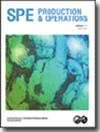Experimental Test Setup for Deoiling Hydrocyclones Using Conventional Pressure Drop Ratio Control
IF 1.3
4区 工程技术
Q2 ENGINEERING, PETROLEUM
引用次数: 2
Abstract
Produced water is a major challenge in the oil and gas industry, especially with the aging of oil fields. Proper treatment of produced water is important in reducing the environmental footprint of oil and gas production. On offshore platforms, hydrocyclones are commonly used for produced-water treatment. However, maintaining the efficiency of hydrocyclones subjected to plant disturbances is a difficult task owing to their compact nature. This paper describes a new experimental test rig built at the Department of Mechanical and Industrial Engineering at the Norwegian University of Science and Technology for testing industrial-scale hydrocyclones. The test setup can emulate first-stage separation and create plant disturbances, such as changes in flow rate, oil concentration, and oil droplet distribution at the inlet of the hydrocyclones. Also, the setup is capable of testing different control algorithms, which helps to maintain the efficiency of hydrocyclones in the presence of such disturbances. The test rig is equipped with various instruments that can monitor such parameters as pressure, flow, temperature, and oil concentration. A typical pressure drop ratio (PDR) control scheme for hydrocyclones is tested in the test rig, which can control the disturbances in the inflow rate. The PDR control scheme does not detect disturbances in the inlet oil concentration and changes in droplet distribution, and these scenarios are shown experimentally in this paper.常规压降比控制水力旋流器脱油试验装置
采出水是油气行业面临的主要挑战,尤其是随着油田的老化。采出水的适当处理对于减少油气生产的环境足迹非常重要。在海上平台上,水力旋流器通常用于采出水处理。然而,由于水力旋流器结构紧凑,在植物扰动下保持其效率是一项艰巨的任务。本文介绍了挪威科技大学机械与工业工程系为测试工业规模的水力旋流器而建造的一个新的实验试验台。试验装置可以模拟第一阶段的分离,并产生植物干扰,如流量、油浓度和油滴分布在水力旋流器入口处的变化。此外,该装置能够测试不同的控制算法,这有助于在存在此类干扰的情况下保持水力旋流器的效率。该试验台配备了各种仪器,可以监测压力、流量、温度、油浓度等参数。在试验台上对一种典型的水力旋流器压降比控制方案进行了试验,该方案能够有效地控制流入流量的扰动。PDR控制方案没有检测到进口油浓度的扰动和液滴分布的变化,这些情况在实验中得到了证明。
本文章由计算机程序翻译,如有差异,请以英文原文为准。
求助全文
约1分钟内获得全文
求助全文
来源期刊

Spe Production & Operations
工程技术-工程:石油
CiteScore
3.70
自引率
8.30%
发文量
54
审稿时长
3 months
期刊介绍:
SPE Production & Operations includes papers on production operations, artificial lift, downhole equipment, formation damage control, multiphase flow, workovers, stimulation, facility design and operations, water treatment, project management, construction methods and equipment, and related PFC systems and emerging technologies.
 求助内容:
求助内容: 应助结果提醒方式:
应助结果提醒方式:


